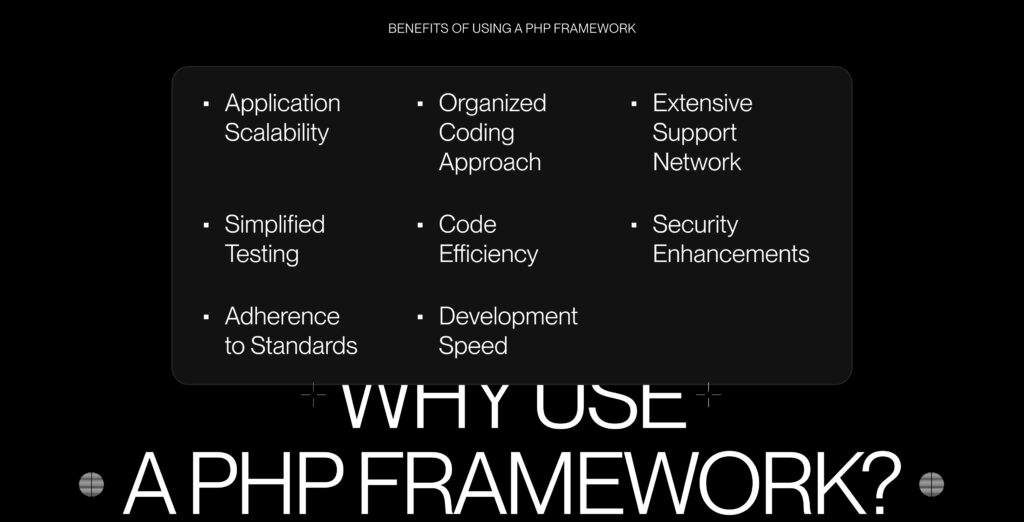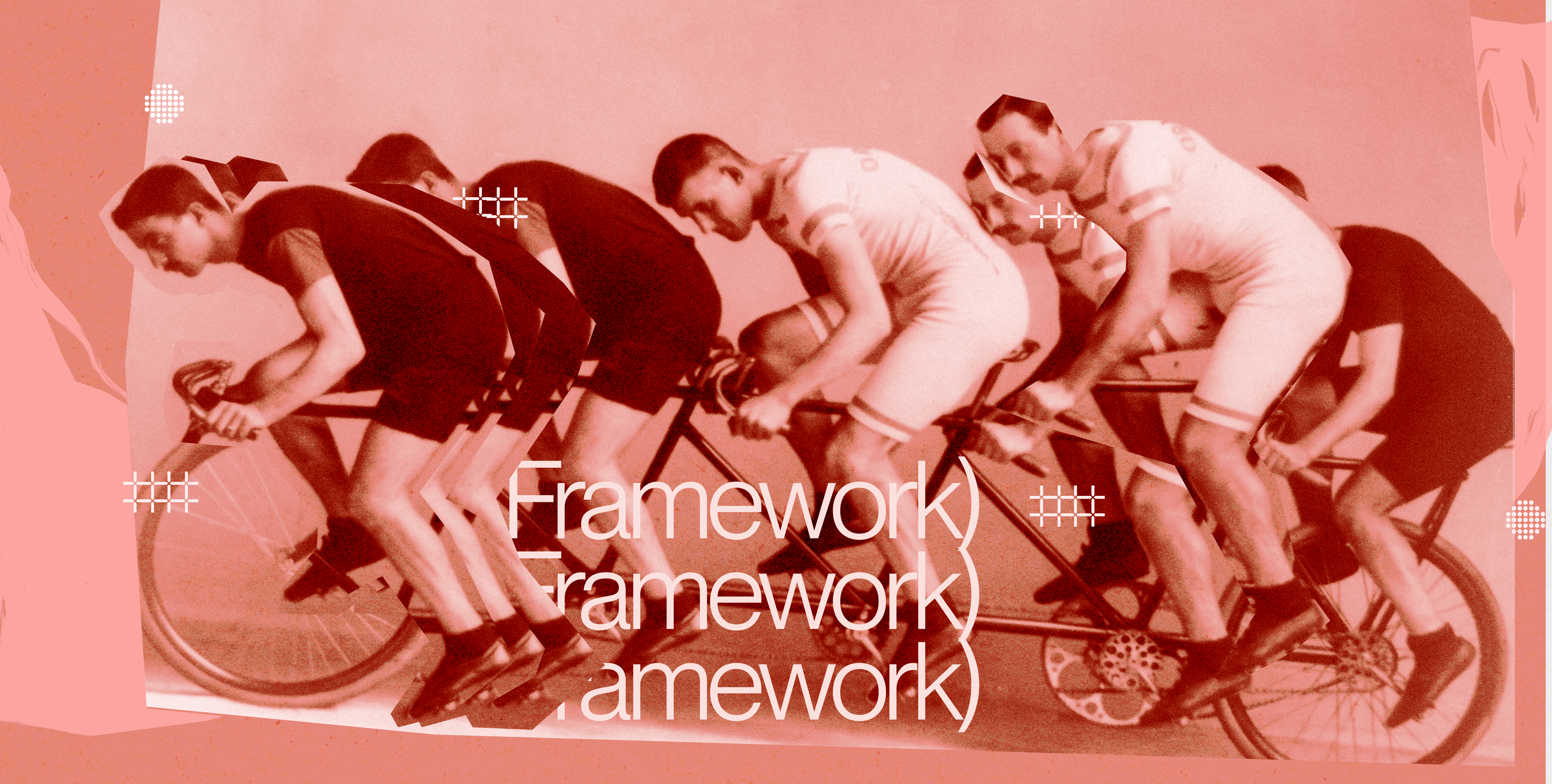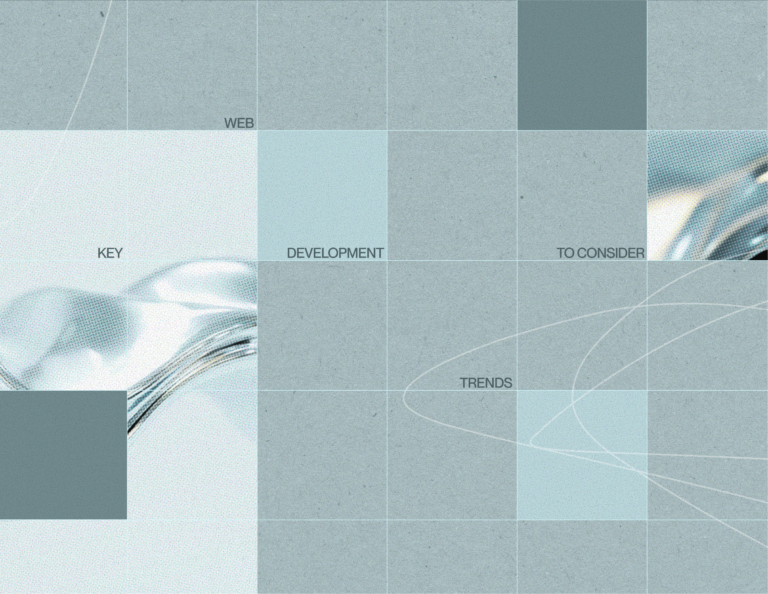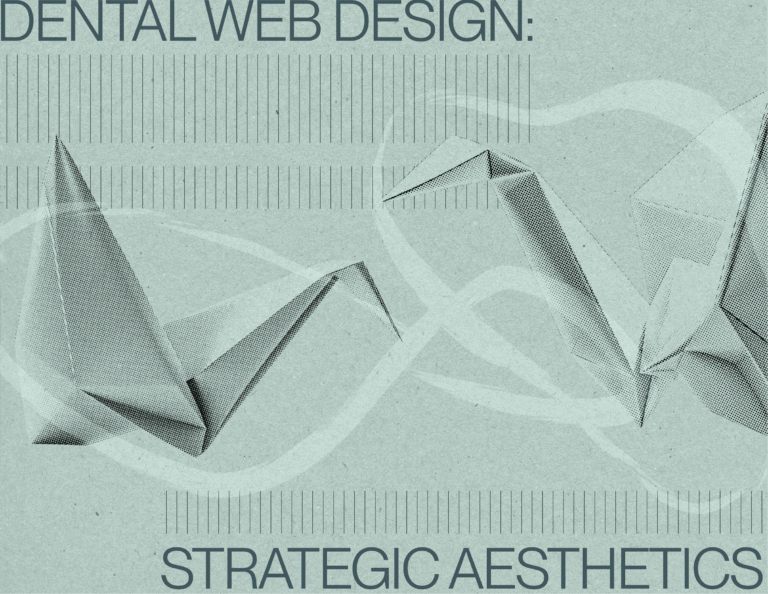Outline:
We know that technology moves fast, but some things, like PHP development, stand the test of time. It’s a powerhouse behind many of the websites and apps you use every day, and for a good reason. It’s easy to get started with, incredibly flexible, and has a massive community of developers.
Think of PHP frameworks as the secret sauce that makes good PHP development great. They help organize your code, speed up the development process, and ensure your projects are up to snuff when it comes to the highest web standards. Plus, they make maintenance a breeze.
We’ve put together this guide to help you navigate the wide world of the most popular PHP frameworks in 2025. Whether you’re building your first site or you’re a seasoned developer looking to switch things up, understanding what each framework offers is key. We’ll break down their strengths, and challenges, and why they might be the perfect choice for your next project.
What to Look for in a PHP Framework 2025
When you’re standing before a buffet of PHP frameworks, each promising to be the next best thing for your work, how do you choose? What is the most popular PHP framework? Here are some essential factors to consider that can help you decide which PHP framework will best meet your development needs.
Performance & Efficiency
First things first: how fast does the PHP framework run? Speed can be a deal breaker, especially for projects requiring high performance under load. Look for a framework that balances functionality with speed, so your applications don’t just run smoothly—they fly.
Ease of Use
You want a PHP framework that makes life easier, not one that ties you up in knots. Look for clear documentation, a straightforward setup process, and an active community. If a PHP framework is intuitive and well-supported, you’ll spend less time wrestling with code and more time bringing your ideas to life.
Community Support
A vibrant community doesn’t just mean good company; it’s a lifeline. Strong support means you’ll find help when you run into bugs or need advice on best practices. Plus, a large community often means a wealth of plugins and extensions are at your fingertips, giving you the tools to extend your application’s capabilities easily.
Scalability
As your application grows, your chosen PHP framework should be able to keep up. Consider frameworks that make it easy to scale both vertically (adding more resources) and horizontally ( servers). Scalability ensures that as your user base grows, your application continues to perform optimally without a complete overhaul.
Security Features
Security is non-negotiable. With cyber threats evolving every day, choose a PHP framework that prioritizes security and is regularly updated to guard against vulnerabilities. Features like input and data sanitation, CSRF protection, and secure authentication should be on your checklist.
Choosing the right PHP framework for your backend development services is about balancing these factors to find the best fit for your project’s needs. With these guidelines in mind, let’s take a closer look at the best PHP frameworks.
In-depth Overview of Best PHP Frameworks
Now that you know what to look for in a PHP framework, let’s consider the specifics of some of the frameworks out there. Each of these PHP frameworks has carved out its space in the development community for good reasons. We’ll explore what makes each one stand out, and why it might be the right—or wrong—fit for your next project.
#Laravel: Your All-in-One Toolkit for Outstanding Web Apps
Laravel isn’t just another PHP framework; think of it as your trusty sidekick for making web apps excellent from start to finish. It is easy-to-understand syntax and advanced features take the hassle out of things like user authentication, setting up routes, handling sessions, and storing data efficiently. No wonder developers everywhere are loving it!
With Laravel, you get a whole toolbox of goodies, including Eloquent ORM for playing with databases like a pro. Plus, there’s a bustling community out there creating all sorts of add-ons and tutorials, so you’re never alone on your coding journey.
#Symfony: Powering Big Business Solutions with Ease
Symfony’s like the Swiss Army knife of web development, especially when it comes to building serious web applications for big businesses. It’s built on a bunch of handy PHP components that can work together or separately, giving you the freedom to customize as you please.
Symfony keeps things light and breezy with Composer, so you only install what you need. And with built-in testing tools, you can keep your code clean, even as your project grows and grows.
#CodeIgniter: Quick & Simple
When you need to whip up a web app in a hurry, CodeIgniter’s your go-to guy. It’s small, it’s fast, and it gets the job done without any fuss.
Setting up CodeIgniter PHP framework is a breeze, and you’ll be amazed at how quickly you can get from idea to finished product. Plus, it’s got all the security bells and whistles you need to keep your app safe.
#Yii: Turbocharge Your Web Projects
Yii’s like a rocket booster for your web apps, especially if you’re building something big like a forum or an online store.
One of the best things about Yii is its lazy loading trick, which makes everything run super smoothly. And with top-notch security features baked right in, you can be sure that your app’s locked up tight.
#Phalcon: Fast & Flexible
Phalcon PHP framework is like the sports car of web frameworks, zooming along at top speed thanks to its special C extension magic.
Unlike other PHP frameworks that grab all the resources, Phalcon keeps things nice and light, so your app stays speedy no matter how many users are in. And with a bunch of great built in features, you’ve got everything you need to build something truly outstanding.
#CakePHP: Making Web Development a Piece of Cake
With built-in tools for everything from security to code generation, you’ll be amazed at how quickly you can turn your ideas into reality with CakePHP. With its neat and tidy code, working in a team is a breeze. No more headaches trying to decipher messy code.
#Zend Framework (Laminas Project): Your Rock-Solid Foundation
The Zend Framework, now known as the Laminas Project, has been the backbone of countless enterprise projects for years. With its rock-solid architecture and endless list of features, it’s the perfect choice for building big, complex apps.
And thanks to its modular design, you can pick and choose exactly what you need, so you’re never weighed down by unnecessary extras. Whether you’re building a bespoke solution or integrating with existing systems, Zend has you covered.
#Slim: Agile & Effective
Slim’s all about keeping things simple and streamlined, which is perfect for small projects. With features like HTTP caching and URL routing, it provides everything you need without the extra fluff. Its simplicity means less time spent on coding and more time on building. Who said web development had to be complicated?
Ester Digital’s Take on PHP Frameworks
From our perspective, the continuous evolution of PHP frameworks is not just about keeping up with technology trends but also about shaping them. The right PHP framework can dramatically enhance the developer experience and output, turning complex challenges into manageable tasks.
At Ester Digital, we’ve leveraged these frameworks to deliver bespoke solutions that not only meet our clients’ needs but also exceed their expectations in performance and scalability.
We believe that the ongoing developments in PHP frameworks are creating more opportunities for building robust, efficient, and secure web applications. As these PHP frameworks mature, they become even more essential tools in the developer’s toolkit, capable of handling everything from small-scale projects to comprehensive enterprise solutions.
By staying informed about these PHP frameworks and understanding their core strengths and potential applications, developers can make strategic decisions that align with both current requirements and future growth. Whether it’s building a quick proof of concept or developing a complex enterprise system, PHP frameworks continue to offer the flexibility, efficiency, and scalability needed to succeed. Look at the benefits of using PHP framework:

Integration and Compatibility of the Most Popular PHP Frameworks
As developers choose a PHP framework for their next project, an essential factor to consider is how well it integrates with other technologies and platforms. Integration and compatibility are crucial for ensuring that the chosen PHP framework not only meets current requirements but also adapts seamlessly to future technology ecosystems. Here’s how top PHP frameworks fare in terms of integration and compatibility with other systems.
Seamless Integration with Front-End Frameworks
Most modern PHP frameworks are designed to play nicely with popular front-end frameworks like Vue.js, React, and Angular. Laravel, for instance, offers a streamlined workflow with Vue.js right out of the box, making it a popular choice for developers looking to build dynamic, full-stack applications. Similarly, Symfony’s structure allows it to integrate effortlessly with Angular, facilitating the development of responsive, scalable applications that require robust back-end capabilities paired with interactive front-ends.
Database Compatibility
A framework’s ability to interact with different database systems can significantly impact its applicability for certain projects. Frameworks like Yii and CakePHP support a wide range of databases, including MySQL, SQLite, PostgreSQL, and more, providing developers with the flexibility to choose a database solution that best fits their application’s needs. Moreover, their ORM systems simplify data manipulation, ensuring that database interactions are both secure and efficient.
Server and Environment Compatibility
PHP frameworks vary in their server requirements and environmental compatibilities. For example, Phalcon’s unique C-extension architecture means it requires certain server prerequisites to run, which might not be supported by all hosting providers. On the other hand, frameworks like Slim and CodeIgniter are known for their ability to adapt to almost any server environment, including shared hosting, making them ideal for projects with limited server capabilities.
Support for Middleware and APIs
PHP frameworks that support extensive middleware options and APIs offer developers more control over the request-handling lifecycle. This is particularly useful for applications that require advanced authentication, routing, and session management. Slim excels in this area with its minimalistic design that is highly effective for API development, allowing developers to add only the components they need, thereby optimizing performance and maintainability.
Some More Things to Consider About PHP Framework
Security
In the realm of web development, security cannot be an afterthought; it’s a necessity. When selecting a PHP framework, it’s crucial to consider its built-in security features and practices.
Each PHP framework comes with its own set of tools and methodologies to help safeguard applications from potential threats. Let’s explore how some of the top PHP frameworks handle security, ensuring that your projects are protected right from the start.
- Laravel PHP framework offers extensive security measures out-of-the-box, including protection against CSRF, XSS, and SQL injection attacks, thanks to its Eloquent ORM that automatically sanitizes SQL queries.
- Symfony PHP framework provides a comprehensive security component that handles authentication and authorization, along with a security checker that scans for vulnerabilities.
- CodeIgniter PHP framework keeps security simple with built-in features for input data validation, CSRF protection, and XSS filtering, facilitating strong security practices effortlessly.
- Phalcon PHP framework enhances security through its C-extension structure, minimizing the risk by processing HTTP requests at a lower level and offering features like encryption and secure cookies.
- Slim PHP framework maintains security through simplicity, offering middleware for encryption and CSRF protection that allows developers to add layers of security as needed.
Community and Support
A vibrant community not only enhances the framework’s usability through shared knowledge and resources but also ensures its longevity and relevance.
- Laravel boasts one of the most active communities with vast resources like tutorials and forums that facilitate learning and trouble-solving.
- Symfony’s professional network provides a wealth of knowledge and support through extensive documentation and community events.
- CodeIgniter’s smaller community is known for its dedication, offering substantial support through forums and user guides.
- Yii’s global reach ensures support is available across different languages, making it accessible worldwide.
- Phalcon attracts technically proficient developers who contribute to its niche but innovative community.
By considering both security features and performance capabilities, along with the strength of community support, developers can choose a PHP framework that not only meets technical requirements but also offers a sustainable ecosystem for future growth.
On a Final Note
Choosing the right PHP framework is more than just matching technical requirements; it’s about considering your development team’s expertise, the community and support you’ll need, and how future-proof the framework is in terms of scalability and security. It’s also vital to think about how the PHP framework will integrate with other tools and systems you’re already using.
Picking the Best PHP Framework 2025: Your Decision-Making Guide
- Laravel is perfect for developers looking for a robust, feature-rich PHP framework that also emphasizes ease of use and has a vibrant community for support.
- Symfony excels in building scalable, enterprise-level applications where modularity and long-term support are key.
- CodeIgniter offers simplicity and speed, ideal for beginners or projects that require a lightweight PHP framework.
- Yii shines in applications that need to handle complex transactions and high traffic efficiently.
- Phalcon is the go-to for maximum performance, leveraging its C-extension backbone to deliver speed that other PHP frameworks can hardly match.
- CakePHP and Slim provide great options for rapid development with minimal overhead, catering to projects with specific performance or architectural requirements.
Ultimately, we understand that selecting the right PHP framework can seem daunting, but our team is always here to help you—just send us a note. We hope this guide has provided you with clear insights and practical advice to make an informed choice.





